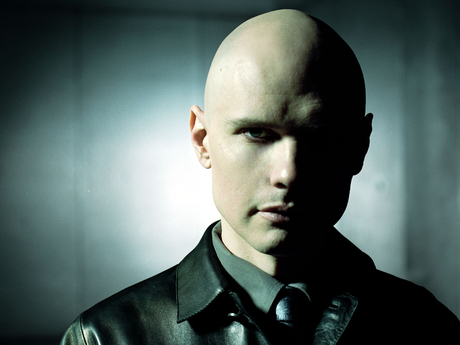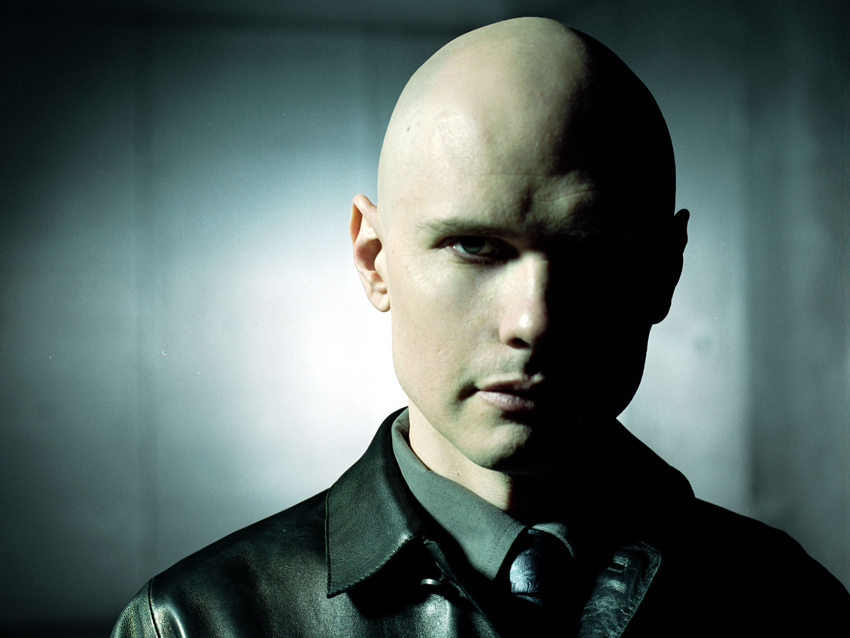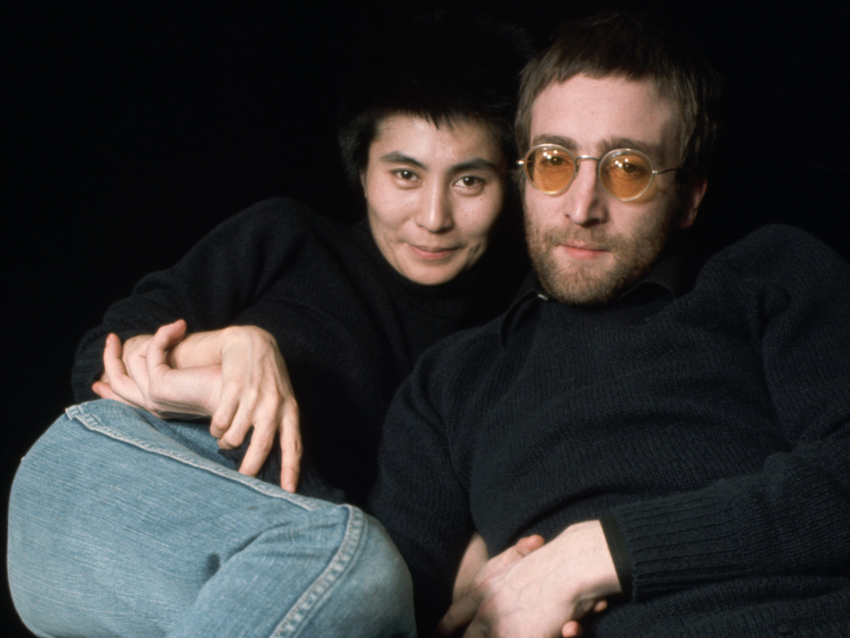The Smashing Pumpkins' Billy Corgan: What John Lennon means to me

Want all the hottest music and gear news, reviews, deals, features and more, direct to your inbox? Sign up here.
You are now subscribed
Your newsletter sign-up was successful

My first encounter with John Lennon and The Beatles came when I was around five years old. I had copy of Meet The Beatles, and at the time, they just seemed like one big Beatle to me. I didn't really differentiate between any of them. Plus, Lennon and McCartney sang a lot of songs together then, and because their vocals blended so well, there didn't seem to be, in many cases, individuated voices. So for a while, it was all about The Beatles instead of John Lennon per se.
"As I grew older, during the '70s, I remember the dialogue about The Beatles was much different than it is now. They were considered an iconic band, of course, but it wasn't on the scale that it is now - I guess the timelessness of their music has magnified their impact on the world. However, I do recall a lot of negative energy being directed towards John at the time, and I think it was because he was being blamed, via Yoko Ono, for breaking up The Beatles. The attitude people seemed to have was, 'Well, if John Lennon wanted it, The Beatles could still be together.' It was sort of put at his feet, that he was depriving the world of Beatles music.
"I started becoming more aware of John as a human being during the five-year-period of his solo career. He was still having hits, but the music seemed angry to me. It had a real bite and edge to it, far more than anything he had done when he was in The Beatles.
"It's funny: Whenever somebody becomes sort of a Christ-like figure, it's hard to tell how he got there. With John Lennon, there was definitely a spiritual progression. Obviously, I was too young to follow it all in real-time, but as I caught up with The Beatles and John and put the whole chronology together, what I could tell was that he was a very angry young man who, because of his great talents, found himself in the biggest band in the world.
"At some point along the way, however, he started to have epiphanies. The first one that became apparent to the public was when he discovered Bob Dylan, and through Dylan he decided, 'Hey, I'm going to write real lyrics, too.' And of course, we all found that he had a tremendous gift for that. Help! was probably one of his first confessional songs, where he really opened up. Then we can go to Norwegian Wood, where he's basically talking about cheating on his wife. So that was John Lennon in 1965. Already, what a leap.
"And then in 1967, he's singing Strawberry Fields Forever, and what's beautiful about that song is that it's an Impressionist painting. He's standing on the edge of consciousness, feeling extremely isolated and he's looking back at an idealized time in his childhood. Already, in just those few years, we're talking about very high-level work, but yet he was letting us inside his personal conflicts and awakenings.
"Watching his changes, even in hindsight, is remarkable. He went through something of a public disintegration, starting in 1965 with Help! and then going up till the end of the '60s when he was this bearded guy singing Yer Blues, talking about how lonely he was and that he wanted to die - which he later admitted was because he was on heroin.
Want all the hottest music and gear news, reviews, deals, features and more, direct to your inbox? Sign up here.
"It must have been so hard for him during those years. When he took that leap at the end of the '60s and decided that he didn't want to be a Beatle anymore - and let's face it, 99.9 percent of the population wouldn't have the balls to do that - he created a negative set of circumstances in which to do it.
"I've talked to [producer] Roy Thomas Baker, who used to go sit in on some of The Beatles' sessions, and he told me how John had Yoko set up in a bed during the making of The White Album, and that she would say things like 'I don't like that' after the group finished playing something. I mean, I'm sorry, I've been in a band for a long time, and that kind of stuff just doesn't fly. But that was John's way of starting to break up The Beatles - by letting Yoko take the heat for it."

John with Yoko in 1973, before the 'meltdown.' © Penny Tweedie/CORBIS
"What is really interesting to me about John after The Beatles was how he realized, 'OK, I've got all this power - what do I do with it?' Because he wasn't so much interested in the music like he used to be, he became something of a radical. There were some very positive things to come out of that, the bed-ins and 'Make love, not war' and things like that. At the same time, he was getting involved with some really dicey people and writing songs like Free John Sinclair.
"As we know from history and many biographies, it kind of all goes south and he had a complete meltdown. He leaves Yoko and goes to L.A. and hangs out with Harry Nilsson, gets drunk, gets thrown out of nightclubs - it was like he was trying to destroy the John Lennon that people loved because he didn't believe the myth. He was searching for something, but he did it in a very public way, an embarrassing way. He became a pariah to a lot of people. Talk about one hell of a journey!
"At the tale's end, he goes back to Yoko, becomes a father again and walks away from music to be a homebody. I've heard the Dakota Tapes he made during this period, and he was still quite capable of writing fantastic music. But for him, at this point, he had to find something else, and withdrawing from public view was the only way to do it.
"What I find continually fascinating about John Lennon was how he allowed us to have a look at his spiritual arc, both through his music and the activities he involved himself in. That takes a very special person operating on a very high level. Not many people have the guts to expose themselves to the world like he did.
"As for what I took from John Lennon in regards to my own music, I didn't have that 'light bulb moment' until after we put out the first Smashing Pumpkins album. I remember talking to people, friends of mine, and hearing them say, 'Why aren't the ideas you're discussing in your lyrics?' And I had to finally say to myself, 'Yeah, why is that?' And I realized that I was afraid. Once I finally got up the nerve to start sharing who I am in my music, John Lennon was definitely a huge inspiration. Think about it: it's pretty fascinating to write a pathological song about your own narcissism and self-negation - oh, and by the way, it's a number one hit!
"What I find continually fascinating about John Lennon was how he allowed us to have a look at his spiritual arc, both through his music and the activities he involved himself in."
"Personal writers, of which there aren't many who operate at a very high level - Robert Smith from The Cure and Martin Gore from Depeche Mode are two examples - are able to be themselves in their music but in a way that doesn't turn people off. What I've found is that, if I write about other people, the songs don't resonate. But if I write about myself, it affects people - I can't explain it, but it's true. John Lennon was an 'I' writer, whereas Bob Dylan was more of a 'you' writer. So John's fearlessness as an artist has really had an impact on how I can let people inside my own head and not be afraid about what they're going to think.
"What also makes John Lennon remarkable to me is, he was the ultimate chameleon. He could steal what he wanted to steal, but he could make it his own. He could write a Chuck Berry song better than Chuck Berry. Then he could write the ultimate song, one that defined a genre or a generation - and then he moved on. It's mind-blowing. If you were to listen to John Lennon's music in a chronological order, the man never repeated himself. I can't think of another artist like that. What that shows is an incredible talent for personalization, assimilation, and then putting it out there in a way that he could own."
"There's so many facets to John Lennon's role in the world as a human being and an artist. Even his assessment of his own work reveals so much about him. He was quick to say, 'Hey, I'm nobody. I'm not any better than you, lesser than you, I'm just me.' He didn't buy the bullshit of the world. I remember reading the interviews he did with Jann Wenner from Rolling Stone. Wenner was very quick to praise Lennon, and John kept saying, 'Oh, that's a crap song,' or 'Oh, that one didn't mean anything.' That unvarnished degree of introspection and honesty is pretty rare.
"The thing about any great artist, and I would put John Lennon in almost a Picasso-esque category, is that they exist on so many levels that if you immerse yourself in their world, you realize that each layer tells you something new. In Lennon's case, the song was really just the tip of the iceberg."
"At the end of the day, John Lennon's life was a work of art, and I study his life as just that - a work of art. You can't say that about too may people, and I think that's why he remains so huge and inspiring to me and millions of others years after his death.
"As much as he's been sanitized since his passing, and I can't argue with why, he was a very flawed human being. I don't say that in judgement. He was a prickly pear. But he was an incredible dreamer, an honest person, and he lived within the doubt of his own honesty.
"I want to add one last thing: I think we have to give a lot of credit to Yoko Ono. She realized that John Lennon was a world-class artist, and she got him to engage in a different approach to his work. And in some ways, maybe his music suffered, but his public work, using the world stage to put out a message of love and peace, might be his enduring legacy."
Liked this? Then check out MusicRadar's Beatles Week. Everything you could want Beatles-wise, all in one place
Connect with MusicRadar: via Twitter, Facebook and YouTube
Get MusicRadar straight to your inbox: Sign up for the free weekly newsletter